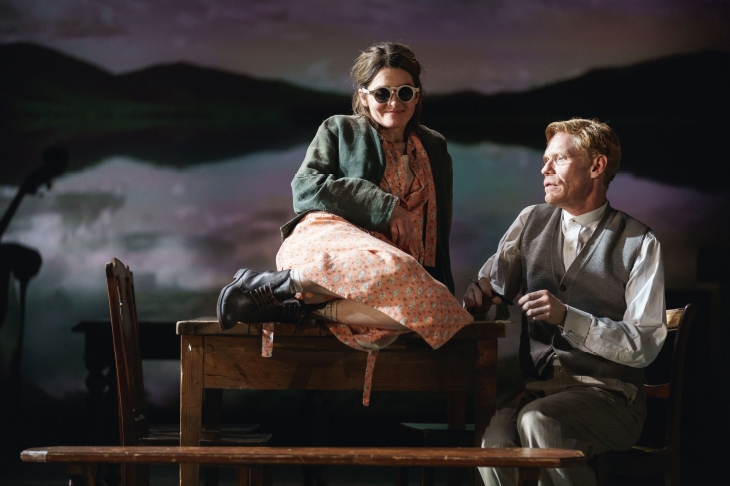Conor McPherson’s new play is set in dust-bowl Minnesota in 1934. We’re in a fly-blown boarding house owned by skint, kindly Nick who has designs on a sexy widow with a big inheritance coming. Good opening. Roll the story. But there’s more. Nick’s useless son is a depressed novelist entangled with a beautiful governess betrothed to a rich man she doesn’t love. An even better opening. Roll the story. But wait. Nick has a black maid called Marianne whom he rescued as a baby and raised as one of the family. An interesting complication. Roll the story. No wait. Marianne claims to be pregnant but declines to reveal whether the father is a rapist or an honourable suitor. And local gossips whisper that her baby bump is fictional. Fascinating. Can we roll the story, please? Not yet. Enter Elizabeth, a manic little poppet, who crashes around the lounge claiming that Mr Perry, a rickety old cobbler, made improper advances towards her and asked her to fondle his ‘Viennese sausage’. Mr Perry, aged 70, shows up and denies Elizabeth’s allegations while trying to woo pregnant Marianne with a cheap bunch of flowers.
Things are getting pretty cluttered in the boarding house and the story hasn’t started yet. Enter a shifty preacher whose hobbies include blackmailing crooks and groping unattended women. With him is ‘Jungle’ Joe Scott, a local boxing champ, who was recently jailed for an armed robbery he didn’t commit. Ready for the story yet? Yes, please. But here come more drifters: a down-and-out businessman whose bottle-blonde wife is flirting with prostitution and whose grown-up son, Elias, is severely handicapped and keeps yelling out, ‘My scarecrow’s lost its hat.’ And finally, after a speech from a mopey doctor, the story begins.
Nick discusses his future life with the rich sexy widow. Then everything comes to a halt. Within minutes, the play has stopped dead. The widow parks her slender behind on a table and starts to belt out a bluegrass classic. A string band appears behind her. A drum kit is discovered, stage-right, in a shaft of light. Someone sits at the drum stool and thwacks out a beat while the widow hits the high notes. The play has turned into a concert. After the first song, we get a second dramatic scene. Which then stops and gives way to another song. And so on. Is this a musical? Not quite, because the numbers don’t complement or enrich the drama. They just trundle along beside it. As entertainment this is disastrous. Characters double as crooners. Take Elizabeth. One minute she’s recounting the horror of being molested by a shoemaker five times her age. Next minute she’s jigging and jiving at the mike-stand and bashing a tambourine against her violated thighs.
This stop-start design allows McPherson to indulge his greatest failing as a writer: rather than advancing a narrative, he likes to retreat and to fill in the ceded territory with irrelevant flourishes. He adds a sad tale about a little girl who fell down a well while her brother was fighting some boys in the woods. And he describes how a newborn baby was crushed to death by its mother in an ‘over-fervent embrace’. The tabloid sentimentality is borderline comic. All that’s missing is a defrocked Jesuit tragically blinded while trying to save conjoined-twin jugglers from a fire at a freak show. The director of this weird muddle is McPherson himself. Sensible writers shun this practice. Wise producers ban it. This is why.
Lucy Kirkwood’s latest introduces us to a brilliant physicist, Alice, working on the Hadron Collider in Geneva. Her widowed mum, also a scientist, hangs around the house in shabby clothes boasting that she’s a genius who received 13 honorary degrees. A second daughter, Jenny, shows up having lost a child by failing to get it immunised. Poor Jenny is treated with astonishing harshness. Alice’s son calls her a murderer. Alice’s boyfriend yells abuse at her. And her nasty mum slings her over a sofa and beats her with a crutch.
Kirkwood’s intention here, I imagine, is to show us that even world-renowned brainboxes are prone to petty jealousy and anger. But to me this looked like a dispiriting catfight with all the characters out to hurt and demean their rivals. At times the script seemed to be pitched at the kind of people who need a year to complete the ten-minute crossword. ‘The universe is expanding,’ says a professor to the audience. ‘Why didn’t you know that? Seriously, read a book …it’s unlikely any of you will understand this, even in the most rudimentary terms.’ As a footnote, I should add that in the interval I heard two separate parties of women praising the play’s brilliant analysis of mother-daughter and sister-sister relationships. So there. What do I know?







Comments